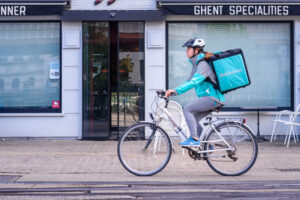<?xml encoding=”utf-8″ ?????????>
Deliveroo riders do not have the right to collective negotiations on pay and conditions, the UK’s top court has ruled, in a blow to gig economy campaigners and the unions that represent them.
The Independent Workers’ Union of Great Britain (IWGB) has been fighting through the courts since 2017 to have Deliveroo riders classified as “workers”, with the right to unionise and bargain collectively for better terms and conditions.
On Tuesday, the supreme court upheld previous judgments that the thousands of UK riders were independent self-employed contractors, and could not be classed as workers because they had the right to arrange a substitute to perform their duties if they did not want to or were unable to.
The union said it was considering its options to challenge the ruling under international law – having reached the UK’s highest court. Any challenge would be likely to involve taking the case to the European court of human rights, with a challenge brought against the UK government rather than Deliveroo, lawyers said.
“The supreme court’s ruling comes as a disappointment after years spent fighting a legal battle to secure riders’ bare minimum employment rights. As a union we cannot accept that thousands of riders should be working without key protections like the right to collective bargaining, and we will continue to make that case using all avenues available to us,” the IWGB said in a statement, adding that it was continuing to sign up more gig economy couriers in an attempt to hold companies to account.
“Flexibility, including the option for account substitution, is no reason to strip workers of basic entitlements like fair pay and collective bargaining rights. This dangerous false dichotomy between rights and flexibility is one that Deliveroo and other gig economy giants rely heavily upon in efforts to legitimise their exploitative business models,” the IWGB added.
Deliveroo said the outcome was “a positive judgment for Deliveroo riders, who value the flexibility that self-employed work offers”, and that thousands of people continued to apply to work with the company every week.
It pointed to a deal with the GMB union under which riders receive free insurance, sickness cover and union recognition without being recognised as workers or employees. The ruling leaves the employer free to choose which union it might wish to recognise, without the risk of a challenge that it has not chosen its workers’ preferred organisation.
Deliveroo said: “UK courts repeatedly and at every level have confirmed that Deliveroo riders are self-employed, and this now includes the supreme court, the highest court in the country.”
Yvonne Gallagher, a partner at the law firm Harbottle & Lewis, said the case was “a fundamentally important ruling for the gig economy, not just for Deliveroo.
“In establishing that the substitution clause works as a proof that riders cannot be considered workers, the supreme court ruling may give rise to other gig economy companies following the Deliveroo employment approach – where it fits their commercial model.”
She said that in the UK “in many cases, the use of substitution clauses means that gig workers will not attract [basic employment rights such as the minimum wage and holiday pay]”.
Gallagher added that if the IWGB wanted to challenge the supreme court ruling in international courts it would have to make a claim in the European court of human rights to argue that the UK has failed to implement its treaty obligations properly – so it would be “a claim brought against the government”.
“Such claims can succeed in forcing governments to change the law, but insisting on widening the definition of those who qualify for employment rights does look quite a stretch,” she said.
